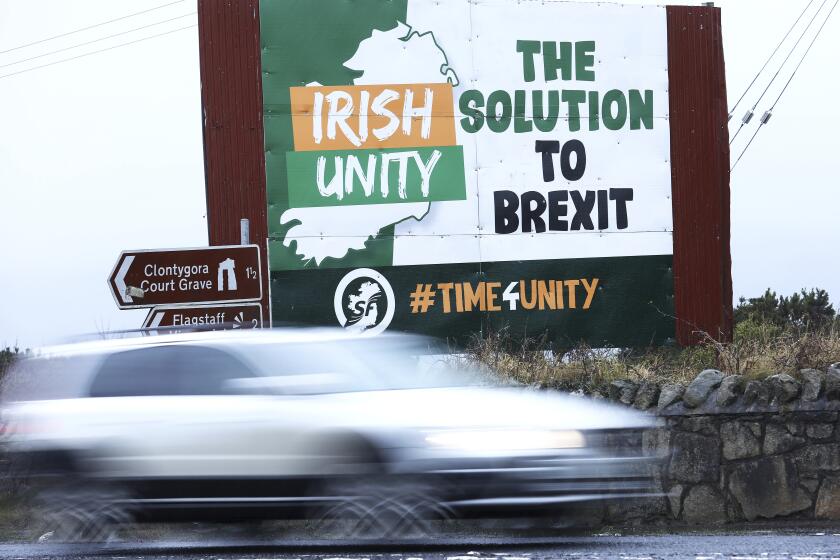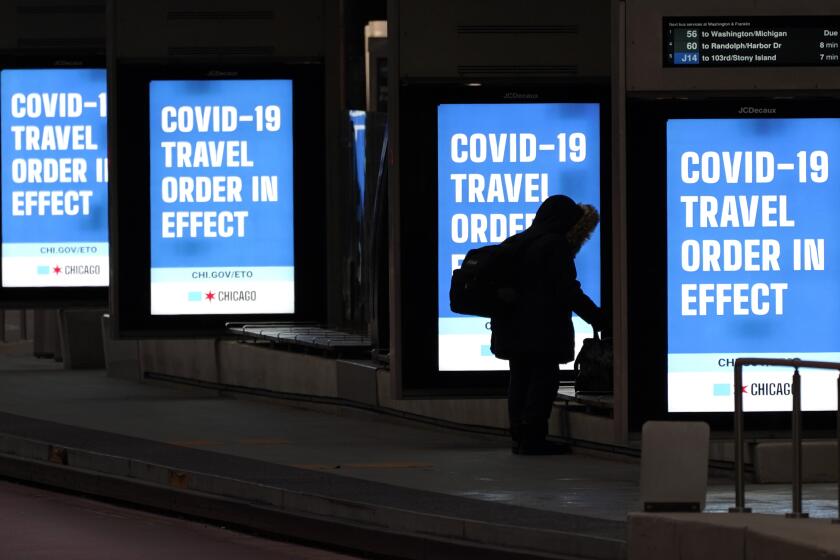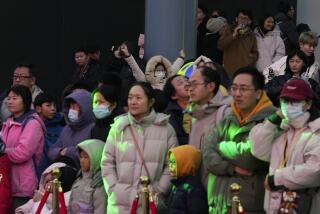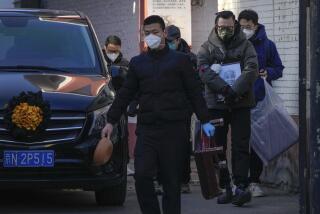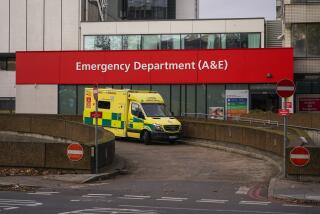A ‘tsunami of grief’ as U.K.’s COVID-19 deaths pass 100,000, the most in Europe
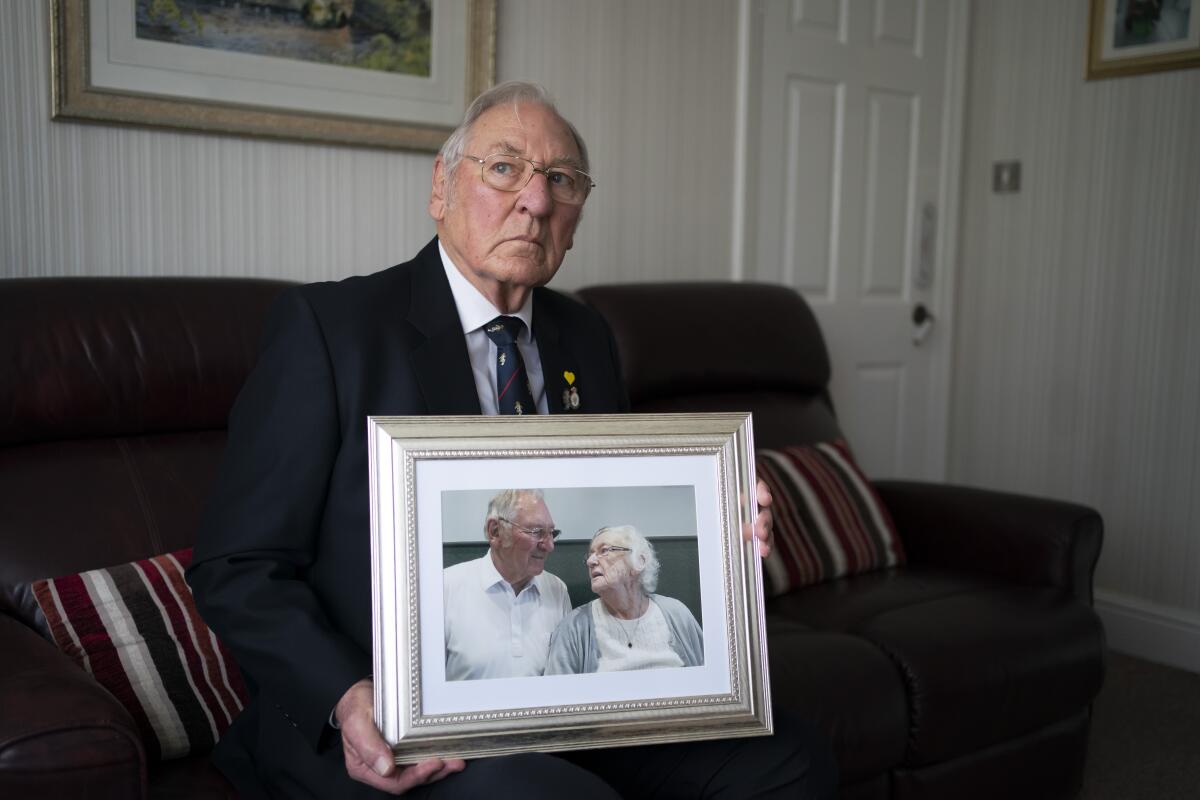
- Share via
LONDON — For nine months, Gordon Bonner has been in the “hinterlands of despair and desolation” after losing his wife of 63 years to the COVID-19 pandemic that has now taken the lives of more than 100,000 people in the United Kingdom.
Only recently did Bonner think he might be able to move on — after sensing the spirit of his wife, Muriel, near him on what would have been her 84th birthday.
“I suddenly understood I had to change my attitude, that memories are not shackles. They are garlands, and one should wear them like garlands around your shoulders and use them to communicate between the quick and the dead,” the retired British Army major said at his home in the northern English city of Leeds. “Grief is the price we pay for love.”
Bonner, 86, is just one of many hundreds of thousands of Britons dealing with grief because of the coronavirus. On Tuesday, the U.K. became the least populous nation to pass the 100,000 mark, after the U.S., Brazil, India and Mexico, according to Johns Hopkins University.
Britain has one of the highest death tolls relative to its population. The U.S., with five times Britain’s population, has four times the number of deaths.
Grief here has been made even more acute by the social distancing measures in place to slow the coronavirus’ spread.
The pandemic’s toll and anger over Brexit in Scotland and Northern Ireland are fueling warnings that the United Kingdom could be headed for a breakup.
“There’s going to be a tsunami of grief and mental health issues this year, next year, ongoing, due to the complications, because of course people haven’t been able to have the usual rituals,” said Linda Magistris, founder of the Good Grief Trust, which brings bereavement services in the U.K. together under one umbrella.
Bonner understands the need for restrictions, but that hasn’t made it any easier.
Six weeks after he was prevented from going to Muriel’s nursing home because of lockdown restrictions and 10 days after she was diagnosed with COVID-19, Bonner was summoned to the hospital and, “dressed like a spaceman,” he bore witness to his wife’s final agonizing moments.
“She was working so hard to draw breath. Her lips were pursed as if she was sucking on a straw,” he said. “I can see her face now with her lips in that position, and it was devastating.”
British scientists have bolstered their case that the new coronavirus variant spreads more easily than its predecessors. It could be worse in the U.S., they warn.
That was the last time he saw Muriel. And in what he termed a “wicked twist in the tale,” Bonner was not offered the chance to replace that memory as his wife’s body was deemed a “reservoir of active coronavirus.” He wasn’t even able to have her dressed the way he wanted for her cremation. Hugs with friends and family were officially off-limits.
Bereavement charities have tried to help people like Bonner, but resources are stretched, especially when the country is regularly recording more than 1,000 deaths a day. The government is being urged to provide extra funding to bolster helplines, counseling services and other community support programs.
“It will be a really positive thing when things can hopefully get back to some degree of normality, but I think that would also be a very difficult moment because we’ve all been a bit frozen in time,” said Jo Goodman, who lost her 72-year-old father, Stuart, last April, just days after he tested positive for the coronavirus.
After her father’s death, Goodman, 32, co-founded the COVID-19 Bereaved Families for Justice group to pressure the government to back a public inquiry into how the pandemic was handled last spring.
“We can’t normalize the fact that hundreds upon hundreds of people are dying every day and knowing what their families are going through,” Goodman said.
More to Read
Sign up for Essential California
The most important California stories and recommendations in your inbox every morning.
You may occasionally receive promotional content from the Los Angeles Times.
